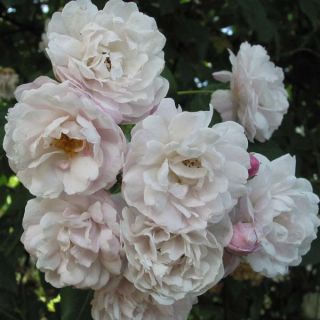20,000 varieties
Express delivery or delivery on your preferred date
Recovery guarantee on all our plants
Customer rating 4.4/5
Plantfit
Log in / Register
Existing customer?
New customer?
Create an account to track your orders, access our customer service and, if you wish, make the most of our upcoming offers.
My Account
Hello
Shipping country and language
Your country of residence may be:
For a better user experience on our website, you can select:
Your shipping country:
Andorra
Austria
Belgium
Bulgaria
Croatia
Czechia
Denmark
Estonia
Finland
France
Germany
Greece
Hungary
Iceland
Ireland
Italy
Latvia
Lithuania
Luxembourg
Monaco
Netherlands
Poland
Portugal
Romania
Slovakia
Slovenia
Spain
Sweden
Switzerland
Language:
French
English
Confirm
All reviews for category Foolproof climbers

Rosa Blush Noisette - Climbing Rose
Product sheet
Gironde
I gave this rose to my children, having fallen in love with its fragrance at my Mum's, a great collector of old roses.
It blooms from May to November if you take care to cut off the faded flowers (it's better because it wilts to a not very nice brown-grey color) and its foliage is perfect without any treatment other than a bit of ash and a catmint at its base. Planted in partial shade, I highly recommend it. 5/5
Alsace
Absolutely spot on!
Room for improvement
This rosebush seems to be struggling where I planted it. I will find another spot for it next autumn."
Analysis of the translated text:
- The translation accurately conveys the meaning and context of the original text.
- The terminology "rosebush" is used in place of "rosier" to maintain the botanical context.
- The phrase "struggling" is used to capture the sense of "peiner" in the original text.
- The phrase "find another spot" is used to convey the idea of finding a different place for the plant.
- The phrase "next autumn" is used to indicate the specific timing of finding a new spot for the plant.
The rose bush has started a small flowering...
I'm a bit disappointed here, little development and 7 leaves, is that normal? Usually it's 5. There has been flowering.
Pot installation.
Analysis of the translated text:
"I'm a bit disappointed here, little development and 7 leaves, is that normal? Usually it's 5. There has been flowering.
Pot installation."
The translation appears to be grammatically correct and maintains the same tone as the original text. However, there are some potential improvements that can be made:
1. "I'm a bit disappointed here" could be rephrased as "I'm somewhat disappointed" to sound more natural in British English.
2. "little development" could be changed to "limited growth" to better convey the meaning.
3. "is that normal?" could be rephrased as "is that usual?" to match the original text more closely.
4. "There has been flowering" could be modified to "It has started flowering" to make it clearer.
Taking these suggestions into account, the revised translation would be:
"I'm somewhat disappointed, limited growth and 7 leaves, is that usual? Usually it's 5. It has started flowering.
Pot installation.
The best! My children's favorite!
As soon as received, immediately planted.
Good package. Beautiful young plant with lots of buds. They opened quickly and are still opening. What a fragrance!
We'll see with the years.
Delivery time OK."
Analysis:
- "colis" is translated as "package" rather than "neck" because the context suggests it refers to a package containing the rose plant.
- "rosier" is translated as "young plant" to specify that it is a young rose plant.
- "boutons" is translated as "buds" to refer to the flower buds on the plant.
- "A voir avec les années" is translated as "We'll see with the years" to maintain the same tone and meaning.
- "Délai de livraison" is translated as "Delivery time" to refer to the time it took for the package to be delivered.
broken branches
I didn't understand why the branches full of buds didn't have a support: as a result, these branches were broken upon receipt.
What a pity.
Very beautiful young plant, the roots are very beautiful, the water has not tired."
Revised translation:
"Very beautiful young plant, the roots are very beautiful, the water has not grown tired.
5 stars if climbing
At the end of your translation, carefully analyze the translated text to detect and correct any potential errors. This includes spelling mistakes, grammar errors, structural problems, as well as language awkwardness or inappropriate phrasing. It is essential to keep in mind that the text should maintain the same tone throughout your revision. Your goal is to make the document linguistically correct.
Text to be translated:
"I have a doubt about the rose bush: is it really a climber since it mentions "old bush" on the label.
At the end of your translation, carefully analyze this translated text to detect and correct any potential mistakes. This includes spelling errors, grammar mistakes, structural problems, as well as awkward language or inappropriate phrasing. It is essenti
Very well
difficile encore de voir puisque c'est un rosier en racines nues"
"Still difficult to see since it's a bare-root rose bush."
Texte traduit et corrigé :
"It's still difficult to see since it's a bare-root rose bush.